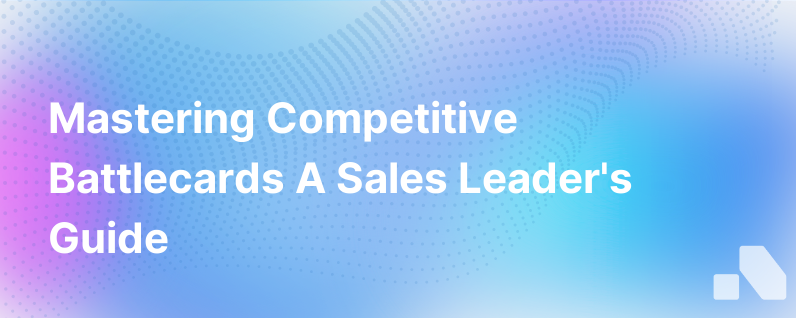
The constant battle with your competition in the B2B sales arena can often feel like a high-stakes game of chess. Game-winning moves often depend on the real-time information you have about the competition. Mastering the art of preparing and using competitive battlecards can provide your sales team with the strategic edge they need to outwit the competition, close deals, and promote overall growth.
What is a Competitive Battlecard?
Essentially, a competitive battlecard is a document designed to arm sales teams with relevant, concise, and actionable insights about the competition. The information is meant to be easily consumable and designed to be used in high-pressure sales situations. Battlecards often include details such as competitors' market positioning, value propositions, pricing strategies, weaknesses, and strengths.
Why Do Your Sales Teams Need Battlecards?
Without a strategic understanding of competitors, sales teams are ill-prepared to contrast and position their solution effectively — perhaps glossing over a unique value proposition or blind-sided by a competitor's strategy. By using succinct, insightful, and real-time battlecards, sales representatives can effectively:
- Overcome objections: Armed with counterarguments and competitor weaknesses, your sales team can better respond to and address objections.
- Pitch better: Highlighting unique value propositions becomes easier when one knows the competitive landscape.
- Close deals faster: When your value proposition is clear compared to the competition, closing deals can be accelerated.
How to Structure an Effective Competitive Battlecard
A battlecard is more than just collecting and dumping information on one page. It should be crafted in a manner that aids your sales team when they need it the most. And, while there's no one-size-fits-all template, an effective battlecard usually consists of:
- Overview: A brief sketch of the competitor’s company, products, and market presence.
- Strengths & Weaknesses: An honest look at the competition's strengths and exploitable weaknesses.
- Value Proposition: A competitor's core value offering and market positioning.
- Pricing Strategy: Information on pricing models and structure, to help gauge your position.
- Objection Handling: Potential objections that could arise and how to refute them.
- Sales Tactics: Inspire your sales reps on how to position against the competition by providing recommended sales tactics.
For any battlecard to be effective, ensure the content is concise, current, and sales rep-friendly. It should be a live document, consistently updated with fresh insights.
Building Your Competitive Battlecard
Creating a competitive battlecard is not a one-time project but a vibrant, evolving process. Here are some steps to get started.
- Identify Your Key Competitors: Ascertain who your primary and secondary competitors are. The severity of competitive threat is a function of market share, geographic overlap, and target demographic.
- Curate Information: Use multiple sources to gather comprehensive data. Tap into publicly available data like company websites, press releases, social media, analysts' reports, or industry journals.
- Observe and Assess: Look beyond the raw data—pay attention to their messaging, marketing campaigns, customer reviews, feature releases, or any strategic partnerships to understand their strategy and performance.
- Update Regularly: The market is volatile and dynamic, and so are your competitors. Maintain regular updates to ensure your battlecards are always relevant.
Leverage Technology for Superior Battlecards
As vital as battlecards are to the sales function, creating and maintaining them can be a cumbersome process. Factor in the need for continuous updates to match the dynamic market landscape, and managing battlecards can soon become a draining task.
This is where platforms like Aomni can make a massive difference. Aomni’s AI platform offers real-time account research and actionable competitive insights, effectively doing the heavy lifting for you. Integrating Aomni into your sales operations can overhaul your battlecard creation process, making it more efficient and robust with data-rich insights.
Conclusion
In the end, competitive battlecards are a potent strategic tool that can enhance your deal-closing efficiency, giving your sales team the cutting edge it needs. By understanding, structuring, and continuously innovating your battlecards and leveraging tools like Aomni, you can propel your sales performance to new heights, winning new deals and retaining customers.